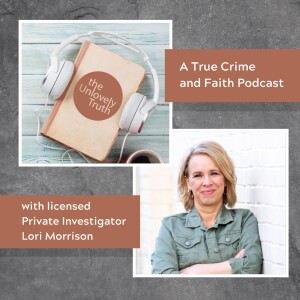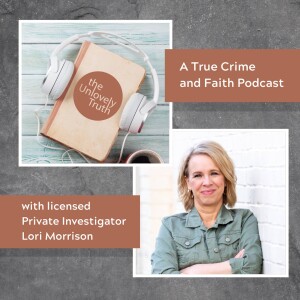
Most people in Lincoln, Illinois, didn’t lock their doors in the 1970’s. They weren’t worried about murderers roaming around. Mike Hartnett and his wife arrived in town to work at Lincoln College, a private junior college. Both were ready to counsel Lincoln’s students and they wondered how much trouble there could possibly be in this peaceful looking small town in 1972. If they’d only known, who knows if they would have gone there at all.
Our book this week is “And I Cried, Too “, by Mike Hartnett. This episode’s guest is our chaplain here at The Unlovely Truth, Lori Prather. She grew up near where these murders took place, and I grew up nearby in the Midwest. We were both pretty sheltered and stories like this were shocking to say the least. But unfortunately, they are reality as well, so I think we need to talk about them to see what takeaways we can glean from them to help ourselves and our communities be safer.
Let’s take a look at a great verse for anyone who thinks the Bible is super hard to understand. Some parts are more difficult than others and require more study to put them in the proper context, but this one is very straight forward. Let’s read it:
“Don’t let anyone fool you. ‘Bad companions make a good person bad.’”
1 Corinthians 15:33
I chose the NIrV translation because it’s made to be easy to read, and easy to understand. And context helps us as well. Paul is writing to the church at Corinth to warn them against false teaching. He knows how easily influenced we can be. In this week’s case, Mike Mansfield went along with someone he thought was his friend and he ended up paying for his misplaced trust with his life.
We’ve all been burned by someone we thought was our friend. We’ve watched it happen to our children too, haven’t we? I'm so grateful that it never went this far for me, and I want to help you keep it from ever going this far in your life or the life of a loved one. To me, one of the biggest steps to accomplish that is a little self-awareness.
In western Christianity, we love to talk about love, and grace, and forgiveness, and happy things like that. Great stuff, of course, but the Bible has a lot to say about evil too. We need to know what God says evil looks and acts like so we can recognize it, in others - and in ourselves.
That’s right. We don’t like to think about that, but we all have the capacity for evil thoughts and deeds. Outside of Scripture, I think the late Russian author Aleksandr Solzhenitsyn said it best. Yes, I love all kinds of stories, even those from Russian dissidents. But listen to what he has to say about how understanding evil really means understanding human nature. “If only it were all so simple! If only there were evil people somewhere insidiously committing evil deeds, and it were necessary only to separate them from the rest of us and destroy them. But the line dividing good and evil cuts through the heart of every human being. And who is willing to destroy a piece of his own heart?”
Let’s all find someone this week that we can have a conversation with about this. The first step toward being safer is being aware of what we have to keep ourselves safe from. And sometimes, that doesn’t look like what we might think it should.
Here are some other episodes you will enjoy:
Season 3, Episode 12: Bitter Jealousy: The Murder that Shocked a Small Town Church
Season 2, Episode 30: Blending In: "The Demon Next Door" by Bryan Burrough
Season 2, Episode 19: How do I Forgive? "Murder by Family" by Kent Whitaker
Season 1, Episode 26: In Broad Daylight
Read the Free Kindle Unlimited version of And I Cried, Too
Find Lori Prather on Facebook
Please visit my website to access more episodes, read my blog posts, or check out ways you can financially support the podcast so that together we can impact more people, more families, and more communities. If you would like to contact me about booking me as a speaker, or ask about my consulting and investigative services, please email me at lori@theunlovelytruth.com.
More Episodes
 2021-03-09
2021-03-09
 2021-01-26
2021-01-26
 2021-01-19
2021-01-19
 2021-01-12
2021-01-12
 2020-12-15
2020-12-15
 2020-12-08
2020-12-08
 2020-11-24
2020-11-24
Create your
podcast in
minutes
- Full-featured podcast site
- Unlimited storage and bandwidth
- Comprehensive podcast stats
- Distribute to Apple Podcasts, Spotify, and more
- Make money with your podcast
It is Free
- Privacy Policy
- Cookie Policy
- Terms of Use
- Consent Preferences
- Copyright © 2015-2024 Podbean.com






